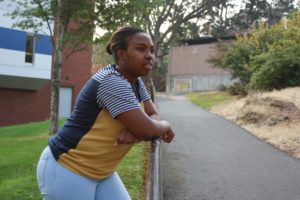34 Saudi Arabian students studying at Camosun are being forced to leave the college before starting their fall classes.
Saudi Arabia has ordered all government-sponsored Saudi Arabian nationals studying in Canada to leave the country in response to tweets from Canadian foreign affairs minister Chrystia Freeland and Global Affairs Canada. Freeland tweeted that she was “very alarmed” by the arrest of female Saudi activist Samar Badawi and called for the release of Badawi and her brother Raif; Global Affairs Canada then tweeted that they were “gravely concerned” about the activists.
Saudi Arabia has taken several measures in reaction to the tweets, including freezing all Saudi state airline Saudia flights to Toronto, transferring Saudi patients to hospitals outside Canada, and ordering an estimated 15,000 Saudi students enrolled across Canada to leave the country and study elsewhere.
Immigration, Refugees and Citizenship Canada media relations advisor Nancy Caron says that, from Immigration, Refugees and Citizenship Canada’s perspective, a foreign national with a valid study permit can continue to study in Canada.
“We can’t speak to the requests made by the Saudi government to its citizens studying in Canada,” says Caron.

Camosun vice president of partnerships Geoff Wilmshurst says his heart goes out to all Saudi Arabian students and their families, and that Camosun is looking into working with the Saudi Arabian Cultural Bureau in Ottawa to see if the 34 students registered at Camosun for this coming fall semester can study at partner institutions in the UK.
“We really valued having those students that we had—more than 100 at one time,” says Wilmshurst. “We don’t know what’s going to happen to them in terms of what their next steps will be; we’ve been told that the Saudi Cultural Bureau—which is the education division of the Saudi embassy in Ottawa—will be assisting in relocation.”
But Wilmshurst knows that relocating to a different institution is not a simple thing to do.
“We certainly have communicated that we would be willing to assist to try to find partner schools that we have in the UK that might consider taking them,” says Wilmshurst. “We do want to be helpful.”
On August 7, Saudi students were given four weeks to leave the country. At the time of writing this story, Wilmshurst told Nexus that the students will be able to finish up their summer semester at Camosun before leaving. (No Saudi Arabian students responded to our requests for interviews for this story.)
“What we want to convey to them is we’re there to support them,” says Wilmshurst. “Our Camosun International department is setting up a team of people who will help begin to sort out their programs, and to see what we can do to assist them in terms of any kind of transfer.” (No one at Camosun International was available to speak about the matter.)
Wilmshurst says that Camosun valued having the students in the college community and that the college doesn’t get many students from the Middle East; he hopes that if and when the issue is resolved, the students can come back to Camosun. Supporting the students, he says, will involve looking at each individual student’s academic record and providing paperwork for academic transfers.
“[We’re] trying to figure out, ‘What are the remaining requirements they have in order to get their degrees?’” he says. “We’ll certainly provide all that documentation—and any other documentation—those students can take with them so that when they are being offered an opportunity to go to an institution in another country, they can at least have all the proper documentation.”
Wilmshurst says that the college’s main concern is the students.
“We feel for them,” says Wilmshurst. “We really hope that whatever happens, they’re able to complete the studies that they’ve engaged in here.”
Camosun College Student Society (CCSS) external executive Fillette Umulisa says the CCSS has concerns around the issue.
“We understand that the Saudi Arabian government does not appreciate being called out on human rights abuse and neglect,” she says, adding that the situation has escalated quickly. “I feel like it’s an issue that can be talked down if both parties wish to come together and talk about it.”
Umulisa says that there isn’t a lot the student society can do to support the students in transition because this is a diplomatic argument.
“All we can actually do right now is hope that the Saudi Arabian government acts in the best interest of its students and not disrupt education for people who are not involved in this diplomatic argument,” she says.
The British Columbia Federation of Students (BCFS), of which Camosun students are members, launched a Fairness for International Students campaign at Camosun on August 15 (see below). University of British Columbia Students’ Union Okanagan president Amal Alhuwayshil is from Saudi Arabia; she was at Camosun on August 15 as part of the campaign announcement. Alhuwayshil says that there are over 250 Saudi Arabian students at the University of British Columbia.
“It is very challenging for both those students and the institution, as well as—I can imagine—for your students here [at] Camosun,” she says.
Umulisa says that the student society is really concerned about this situation.
“We’ll continue to support the ability for individuals and government to have discussions and engage in dialogue on issues of human rights around fear of retribution,” she says.
The CCSS supports Camosun students in every way possible, says Umulisa.
“If we’re able to do something,” she says, “we would definitely do it.”

You have shared a great thing. Thanks.